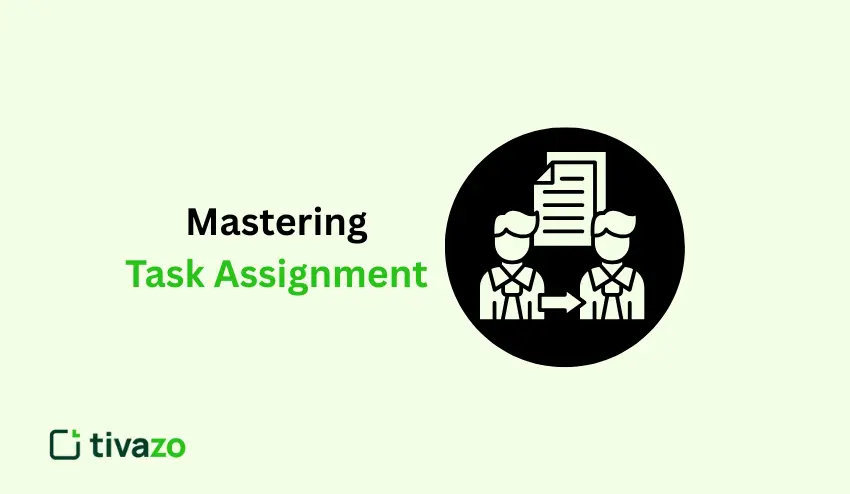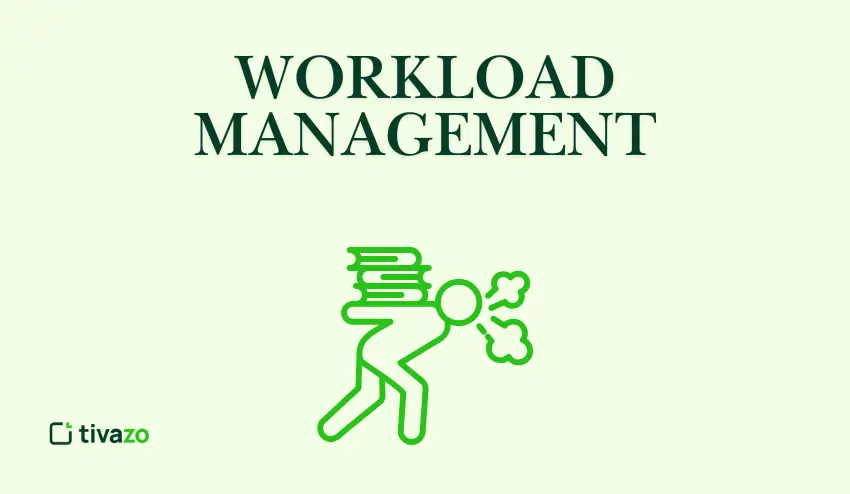In the contemporary work environment, mastering the skills of task management is important to remaining productive, organized, and free from stress. Whether you are managing a team or managing personal tasks, these skills help you to organize, initiate, and complete your work efficiently to avoid burning out.
Let us refresh our understanding of task management skills, why they matter, and how to improve them with practicality, examples, and tools.
What are task management skills?
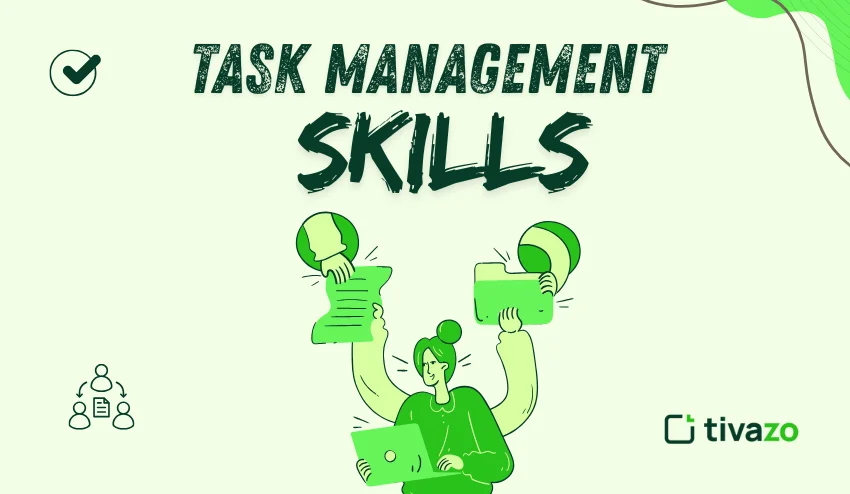
Task management skills are the skills that assist individuals and groups in their tasks by planning, organizing, prioritizing, and completing tasks effectively. These skills enable you to break projects into smaller and manageable pieces, utilize time wisely, and meet deadlines. Task management skills also facilitate management of projects and pending work when priorities change, note when tasks and projects are/were completed, and maintain focus on achieving outcomes, all whilst feeling stressed, and to manage task load properly.
In the end, strong task management skills allow you to juggle multiple responsibilities whilst completing work to a high standard and with sharp focus, and ensure deadlines are met and outcomes maintained. Improving your task management skills will develop both individual performance improvements and more productive team performance.
The benefits of task management skills:
- Efficient use of time.
- Increased work efficiency.
- Reduced stress and burnout.
- Better accountability of work and decisions when working as a team.
- Increased productivity, satisfaction from work or project outcomes.
- More efficient ability to facilitate complex projects.
- Better decision-making and problem-solving capabilities.
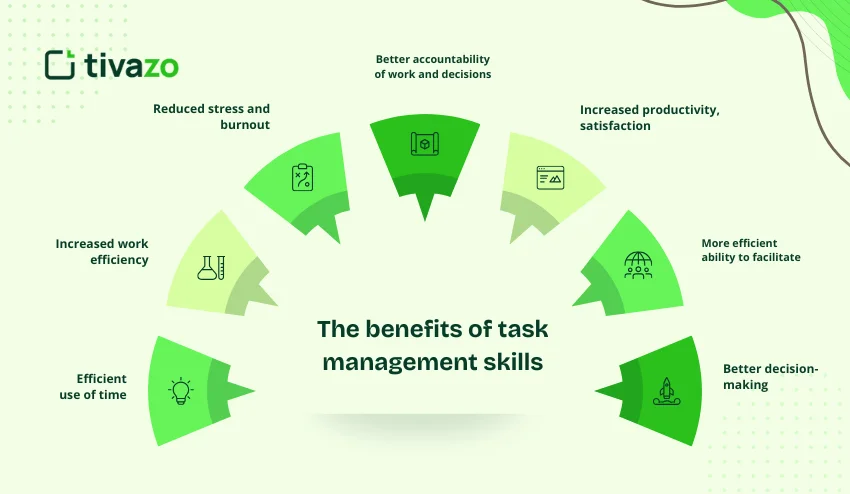
Examples of Task Management Skills at Work
Outlined below are real-life examples of task management skills:
| Scenario | Skill Example |
| Handling Multiple Projects | Prioritization and Scheduling |
| Working with Team Projects | Delegation and Communication |
| Meeting Project Deadlines | Time Estimation and Planning |
| Reporting Process | Task Tracking and Review |
| Restraining from Distractions | Focus and Context Switching Prevention |
The examples above show that task management is in use daily in the workplace. Whether managing a team effort or just focusing on tasks that have a high priority level, mastering these skills can ensure the project is completed effectively, deadlines are met, and quality work is consistently achieved. These abilities will improve individual performance and the effectiveness of your team.
10 Task Management Techniques & Skills
1. Prioritization – Concentrate on What Counts
Prioritization is one of the most important task management skills. It is all about identifying which tasks create the most impact and need to be done first.
Effective Ways to Prioritize Tasks
- Utilize the Eisenhower Matrix: Divide tasks into four quadrants – urgent & important; important, but not urgent; urgent, but not important; neither urgent nor important.
- Use the 80/20 Rule: Focus on the 20% of tasks that create 80% of the outcomes.
- Have clear goals: Decide what you want as a result of the task.
2. Time Management – Make Every Minute Matter
Great task management skills hinge on effective time management. When you learn to properly estimate and account for time, this keeps your workload manageable and attainable.
How to Accurately Estimate Time for Tasks
- Track how long it takes you to do tasks with an app, such as Clockify or Toggl.
- Add an extra 10–20% delay time for unanticipated events.
- Look back at prior similar tasks to determine how long it should take on average.
3. Delegation – Working Smarter, Not Harder
Flowing into the next process management action that is key, delegation is an essential task management skill for all leaders or project managers. Delegating ensures the task is performed by the correct individual based on attributes and expertise.
The best way to delegate work:
- Tasking based on team member strengths
- Provide direction and an expected due date
- Task management program such as Asana, ClickUp, or Trello to track work
- Follow up, but do not micromanage.
4. Planning and Scheduling – Organize Your Work
Even adept professionals may feel overwhelmed by the demands of the range of tasks. Scheduling gives your day structure, ensuring all the tasks can fit together.
Planning approaches:
- Break large tasks into smaller milestone objectives.
- Use Gantt charts or Kanban boards to visualize workflow.
- Daily and weekly goals.
5. Sustaining Focus and Avoiding Context Switching
Switching contexts by bouncing from task to task can decrease productivity by 40%. Of all task management skills, perhaps the most productive skill is your ability to focus on one task at a time.
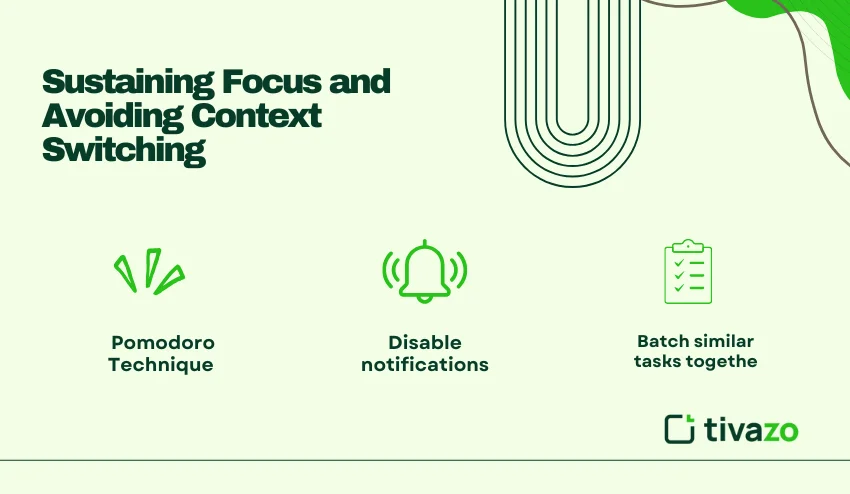
Ways to Avoid Context Switching:
- Use the Pomodoro Technique (25 minutes focused work, plus a 5-minute break).
- Disable notifications you don’t need.
- Batch similar tasks together.
6. Communication – the Lifeblood of Task Management
Good communication ensures everyone understands exactly what needs to be done, when, and how it needs to be done. Of all task management skills, communication is the most impactful on teamwork.
Communication Tips:
- Set expectations before getting started.
- Use project management tools to enhance transparency.
- Give regular feedback and updates.
7. Problem-Solving: Resolve Roadblocks Quickly
While you can plan as well as possible, obstacles will arise. Your task management skills will allow you to spot when there is a problem as quickly as possible and develop actionable solutions.
Example:
If you have a project that is stalled due to a task being dependent on another task, amend your plan immediately. Either push the due date back, reassign the remaining tasks, or modify the action when the task is completed.
8. Adaptability: Be Flexible in Change
Adaptability is a skill of task management, I think is underrated. Things change – deadlines bump, priorities change, and deals collapse. Being adaptable allows you to shift to meet new priorities without losing control.
How to Remain Adaptable:
- Check your progress weekly.
- Leverage any tools that support your task management, and make updates in real-time.
- Always have an alternate plan when critical tasks are pending.
9. Review and Reflect on Tasks
Effective task review will help you determine if the task either worked or did not work, or if you were able to deliver value as planned. Regardless, reviewing and reflecting will create opportunities for ongoing improvement.
How to Conduct a Utilization Review:
- Review completed tasks, jot down all obstacles.
- Ask the question, “Could I have made any better choices or efficiencies?”
- Keep track of what you have learned and improve on it next time,
10. Tools for Task Management
Task management skills today would be much better supported by the modern tools that are on the market.
Some of the most popular task management tools for time tracking and task management are.
| Tool | Best for | Key features |
| Trello | Visual organization | Boards, cards, due dates |
| Asana | Team collaboration | Goals, progress tracking |
| ClickUp | All-in-one workspace | Task docs, timelines |
| Notion | Flexible planning notes | databases, templates |
| Todoist | Personal productivity | prioritization; daily tasks. |
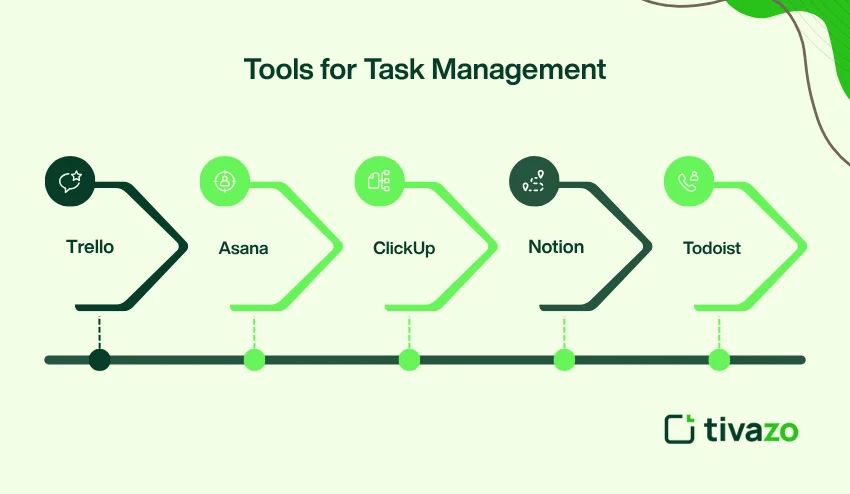
How to Enhance Task Management Abilities
Development does not happen overnight; consistency is key to results. Adding new task management skills will call for a mixture of self-control, planning, and constant improvement. When you establish habits that require less active thinking, you will find that you will be more organized, productive, and focused on the things that need to be done to continue working effectively.
Action Items for Improvement:
- Track your time daily so that you will be better at estimating and be able to find where the time/how much time was being spent.
- Morning, check over your task list every day to decide on priorities, and also execute intentions for the day.
- Automate all tasks that are repetitive by utilizing digital tools where possible. Manual work takes time away from higher-priority work.
- Set SMART goals (so that tasks/connect to outcomes). Be Specific, Measurable, Achievable, Relevant, and Time-bound.
- Reflect on the week on what worked or what didn’t. Evaluate what is ready for improvement.
- Break your large projects into milestones, and try not to be overwhelmed, but see and track progress.
- Solicit feedback from colleagues and /or mentors in your workplace: what could I do to improve my workflow/efficiency?
The Importance of Task Management Skills
Having strong task management skills does not just help you become more productive at work; it also enhances your credibility, decreases stress in the workplace, and helps you be viewed as a great addition to any team. Employees who show task management skills are more likely to meet deadlines, prioritize conflicting obligations, and maintain a consistent quality of work.
Employers want employees who can autonomously organize, observe workflows, and produce deliverables; thus adding value to any project or team. Having strong task management skills also increases collaboration, leads to better decision-making, and creates a favorable work environment by increasing the likelihood of completing goals.
Conclusion
Task management skills can be developed over time, and there are different strategies to adopt. You can at first focus on the simplicity of planning your day, delegating tasks, reflecting or reviewing yourself, and using various tools to support your task management system. You will gradually discover greater levels of production or results with less stress, and you will be a significant contributor to any team or group.
Regular practice will enable you to remain organized, respond to unforeseen challenges promptly, and continue to meet deadlines consistently. Continually improving your task management skills will not only increase your personal productivity in the workplace but also the efficiency and success of a team or organization, and build a healthy and professional workplace culture.

